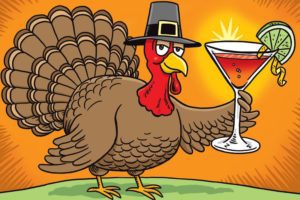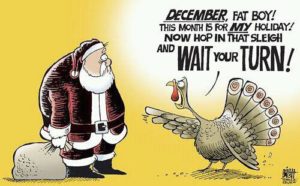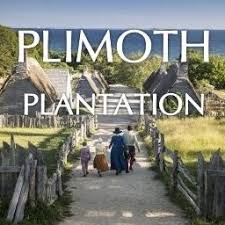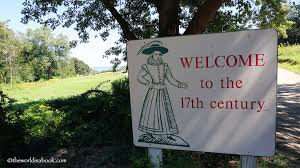But thanks be to God, who gives us the victory through our Lord Jesus Christ!
What’s wrong with this picture?

Or this one?

We may chuckle at these common images of two typically American holidays, but much more is at stake here than changing traditions.
Looking for thanks.
Watch for the coming ‘blitzchris’ of ads and marketing this week leading with holiday headlines of Thanksgiving and Christmas. From television to social media, mega-marketing messages will be unavoidable and ruthlessly relentless.
Therefore note how seemingly positive good news of these holidays ahead will bombard buyers with joyful messages of celebratory consumerism complete with obligatory ‘thanks’ or ‘giving.’
Yet the questions we could ask about Thanksgiving & Christmas should be:
- Is anyone thanking God or
- Is Christ mentioned in anything about Christmas?
Pyimoth Plantation – First Thanksgiving History

People across the world have been celebrating and giving thanks for thousands of years. In this country, long before English colonists arrived, Native People celebrated many different days of thanksgiving.

The English also had a long tradition of thanksgiving. They declared days of prayer to thank God when something good happened. For example, the English declared a day of thanksgiving in the summer of 1623 when a gentle rain ended a long drought.
Likewise, in the fall of 1621, when their labors were rewarded with a bountiful harvest after a year of sickness and scarcity, the Pilgrims gave thanks to God. They also celebrated their bounty with a tradition called the Harvest Home. In a letter to a friend in England,
“E.W.” (Pilgrim Edward Winslow) wrote the only record of the celebration that survives:
We set the last spring some twenty acres of Indian corn, and sowed some six acres of barley and peas, and according to the manner of the Indians, we manured our ground with herrings or rather shads, which we have in great abundance, and take with great ease at our doors. Our corn did prove well, and God be praised, we had a good increase of Indian corn, and our barley indifferent good, but our peas not worth the gathering, for we feared they were too late sown, they came up very well, and blossomed, but the sun parched them in the blossom; our harvest being gotten in, our governor sent four men on fowling, that so we might after a more special manner rejoice together, after we had gathered the fruit of our labors…
Source
Thanksgiving to God
“God be praised,” thanksgiving expressed in a letter to a friend back in England by the Governor of this new world.
And although it be not always so plentiful, as it was at this time with us, yet by the goodness of God, we are so far from want, that we often wish you partakers of our plenty. We have found the Indians very faithful in their covenant of peace with us; very loving and ready to pleasure us: we often go to them, and they come to us; some of us have been fifty miles by land in the country with them; the occasions and relations whereof you shall understand by our general and more full declaration of such things as are worth the noting, yea, it hath pleased God so to possess the Indians with a fear of us, and love unto us…
… They are a people without any religion, or knowledge of any God, yet very trusty, quick of apprehension, ripe-witted, just, the men and women go naked, only a skin about their middles…
… there are grapes, white and red, and very sweet and strong also. Strawberries, gooseberries, raspas, etc. Plums of three sorts, with black and red, being almost as good as a damson: abundance of roses, white, red, and damask: single, but very sweet indeed; the country wanteth only industrious men to employ, for it would grieve your hearts (if as I) you had seen so many miles together by goodly rivers uninhabited, and withal to consider those parts of the world wherein you live, to be even greatly burdened with abundance of people. These things I thought good to let you understand, being the truth of things as near as I could experimentally take knowledge of, and that you might on our behalf give God thanks who hath dealt so favorably with us.
Our supply of men from you came the ninth of November 1621, putting in at Cape Cod, some eight or ten leagues from us, the Indians that dwell thereabout were they who were owners of the corn which we found in caves, for which we have given them full content, and are in great league with them, they sent us word there was a ship near unto them, but thought it to be a Frenchman, and indeed for ourselves, we expected not a friend so soon. But when we perceived that she made for our bay, the governor commanded a great piece to be shot off, to call home such as were abroad at work; whereupon every man, yea, boy that could handle a gun were ready, with full resolution, that if she were an enemy, we would stand in our just defense, not fearing them, but God provided better for us than we supposed; these came all in health unto us, not any being sick by the way (otherwise than seasickness) and so continue at this time, by the blessing of God, the goodwife Ford was delivered of a son the first night she landed, and both of them are very well. When it pleaseth God, we are settled and fitted for the fishing business, and other trading, I doubt not but by the blessing of God, the gain will give content to all; in the mean time, that we have gotten we have sent by this ship, and though it be not much, yet it will witness for us, that we have not been idle, considering the smallness of our number all this summer.
What date?
This solitary letter recording the first Thanksgiving in America, written by the Governor of this Massachusetts colony truly reflects thanksgiving to God. They might have died at sea or could have been killed by their befriended American native neighbors. No, reports Winslow, we thank God.
And when did this now legendary first Thanksgiving take place?
We don’t know for sure why the Wampanoag joined the gathering or exactly what activities went on during those three days. We do know, however, that the celebration occurred sometime between September 21 and November 9, 1621.
So it seems that now in the year of our Lord, 2017, Thanksgiving may be a little late, much overlooked and once more crowded by ‘christmas’ feasting and frenzy.
Next, we will continue with a look a Biblical feasts and fasts with an original intent to praise and thank God.

Leave a Reply